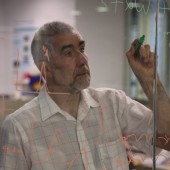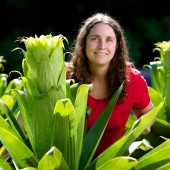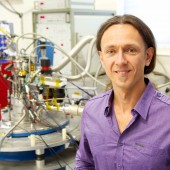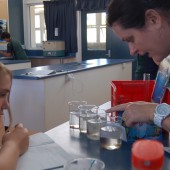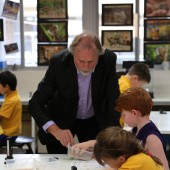The Australian Science Communicators
is proud to present the
Unsung Hero of Australian Science Communication Award
The award will be presented during the
Australian Science Communicators National Conference
2–5 February 2014 in Brisbane.
ASC Unsung Hero Award 2013 Nomination Form – Entry
The Unsung Hero of Australian Science Communication is an initiative of the Australian Science Communicators. The ASC offers this award to honour a person (or group of people) who exemplifies science communication. The award is intended to recognise those whose contribution has been so significant over a period of time that they should by now have been recognised.
Criteria
The criteria for nomination for the Unsung Hero of Australian Science Communication are:
1. Nominees must reside in Australia and be actively engaged in science* communication, interpreted broadly to include, but not limited to, pursuits such as:
- teaching,
- broadcasting,
- script and book writing,
- science shows,
- science promotion and
- interpretation of science within institutions.
* The definition here is broad and includes science, technology and innovation. Also refer to criterion 5.
2. The work for which the nominee is being nominated must have been carried out in Australia.
3. Nominees, whether a person, people or group, should not have received significant recognition for their contribution to science and its promotion. This will almost certainly rule out a ‘top’ or well-known science communicator. The nominee will need to show that they regard science communication as an integral part of scientific endeavour.
4. Nominees should have a considerable or prolonged record (at least several years) in science communication.
Therefore it is unlikely that this would apply to a candidate whose contribution, however significant, is of short duration.
5. Nominators must give careful consideration to what counts as ‘science’ – for example, nominees from technological or environmental fields should be nominated not just on the basis of their contribution to those particular fields, but because the scientific side of their work is strong and their communication contributes to a better understanding of the process and practice of science.
Notes:
This award may be made to a candidate whose work is in education, promotion or communication in one or many fields but where the science component of their work is highly significant.
Benefits of the award
The Unsung Hero award recognises and celebrates excellence in science communication, and is presented at a national level. The scope of the award is not covered in existing national science award programs, and therefore, the Unsung Hero award provides a unique opportunity to celebrate the attributes and practices of science communicators.
For example, a science communication practitioner, this is a valuable acknowledgement of their work and efforts as identified by their peers. As another example, for a scientist who communicates science, the Unsung Hero award recognises the value of their communication efforts and the fact that this work complements their scientific achievements.
The award may help a recipient to focus attention on their efforts, give them greater credibility in their work and raise awareness of the scientific topics that they communicate.
Selection process
Selection is based solely on the written information provided on the nomination form.
A selection committee of representatives from the Australian Science Communicators will assess all nominations and determine the award recipient.
In some instances the selection committee may request further information before making their final decision.
The Australian Science Communicators reserves the right to make no awards should the judges consider that the quality of candidates does not warrant awards, or should the nominated candidate(s) not satisfy the selection criteria.
Award nominations
ASC Unsung Hero Award 2013 Nomination Form – Entry
Requirements for Award Nomination
The nominator must be a financial member of the ASC, but the nominee need not be a member. The nominator should first consult with the nominee and referees to ensure the nominee is aware of, and consents to, the application.
Each nomination must comprise a fully completed award nomination form.
Preferable length: 2 pages.
Nominations close at 5pm on Friday 13 December 2013.
Nomination enquiries to
Sarah Lau
slau@chemcentre.wa.gov.au
Send completed nominations to
Ms Kali Madden
Executive Officer – Australian Science Communicators
PO Box 13, Billinudgel, NSW 2483
Email: office@asc.asn.au

